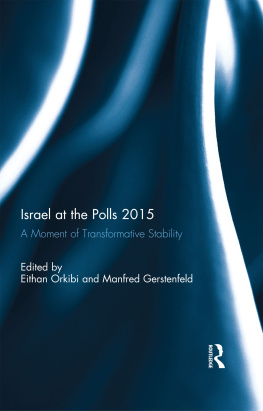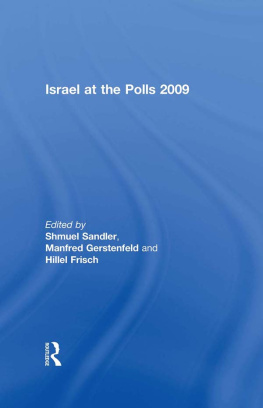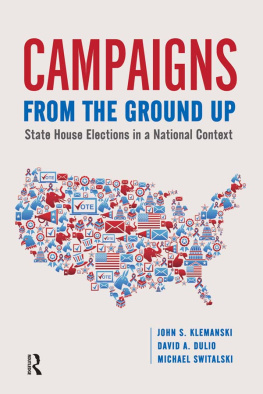Israel at the Polls 2013
The 2013 elections took place less than two years after the overwhelming wave of social protests of summer 2011. At first, the election campaign did not raise much public interest, but the emergence of new players and young political forces energized the political race. Polls conducted throughout the campaign greatly deviated from the final results, which eventually enabled Prime Minister Benjamin Netanyahu to form a cabinet again, despite a loss of 11 seats for his list.
This book describes and analyses a variety of political and sociological developments in Israel both before and after the elections. These include the nature of the campaign, the developments in the National Camp, among religious Zionists, the ultra-Orthodox parties, and the Russian vote. Furthermore, it assesses the impact of media, including new media.
The variety of subjects makes the book suitable for undergraduate and graduate students in Middle-Eastern, Israeli, and Jewish studies, as well as political science and liberal arts in general. Israel at the Polls has been updated and published regularly for thirty-five years, providing readers with up-to-date analysis and continuity of scholarship. This book offers a long-term assessment of Israeli politics.
This book was published as a special issue of Israel Affairs .
Eithan Orkibi is a lecturer in the Department of Sociology and Anthropology at Ariel University, and a member of the ADARR (Analysis of Discourse, Argumentation and Rhetoric) research group, Tel Aviv. He specializes in political culture, discourse analysis and persuasive communication.
Manfred Gerstenfeld is the Emeritus Chairman of the Jerusalem Center for Public Affairs, Israel. He is the former editor of The Jewish Political Studies Review, and has published twenty-three books covering diverse areas such as anti-Semitism, Judaism and the environment, contemporary history, and Jewish public affairs.
Israel at the Polls 2013
Continuity and change in Israeli
political culture
Edited by
Eithan Orkibi and Manfred Gerstenfeld
First published 2016
by Routledge
2 Park Square, Milton Park, Abingdon, Oxon, OX14 4RN, UK
and by Routledge
711 Third Avenue, New York, NY 10017, USA
Routledge is an imprint of the Taylor & Francis Group, an informa business
2016 Taylor & Francis
All rights reserved. No part of this book may be reprinted or reproduced or utilised in any form or by any electronic, mechanical, or other means, now known or hereafter invented, including photocopying and recording, or in any information storage or retrieval system, without permission in writing from the publishers.
Trademark notice : Product or corporate names may be trademarks or registered trademarks, and are used only for identification and explanation without intent to infringe.
British Library Cataloguing in Publication Data
A catalogue record for this book is available from the British Library
ISBN 13: 978-1-138-94587-6
Typeset in Times New Roman
by RefineCatch Limited, Bungay, Suffolk
Publishers Note
The publisher accepts responsibility for any inconsistencies that may have arisen during the conversion of this book from journal articles to book chapters, namely the possible inclusion of journal terminology.
Disclaimer
Every effort has been made to contact copyright holders for their permission to reprint material in this book. The publishers would be grateful to hear from any copyright holder who is not here acknowledged and will undertake to rectify any errors or omissions in future editions of this book.
Contents
Manfred Gerstenfeld
Arie Perliger and Eran Zaidise
Anat Roth
Nissim Leon
Vladimir (Zeev) Khanin
Rafi Mann
Eithan Orkibi
Eyal Lewin
The chapters in this book were originally published in Israel Affairs , volume 21, issue 2 (April 2015). When citing this material, please use the original page numbering for each article, as follows:
Chapter 1
The Run-Up to Israels 2013 Elections: A Political History
Manfred Gerstenfeld
Israel Affairs , volume 21, issue 2 (April 2015) pp. 177194
Chapter 2
The Peculiar Victory of The National Camp in the 2013 Israeli Election
Arie Perliger and Eran Zaidise
Israel Affairs , volume 21, issue 2 (April 2015) pp. 195208
Chapter 3
Something new begins religious Zionism in the 2013 elections: from decline to political recovery
Anat Roth
Israel Affairs , volume 21, issue 2 (April 2015) pp. 209229
Chapter 4
An uneasy stability: the Haredi parties emergency campaign for the 2013 elections
Nissim Leon
Israel Affairs , volume 21, issue 2 (April 2015) pp. 230244
Chapter 5
The political transformation of the Israeli Russian street in the 2013 elections
Vladimir (Zeev) Khanin
Israel Affairs , volume 21, issue 2 (April 2015) pp. 245261
Chapter 6
The Transmigration of Media Personalities and Celebrities to Politics: The Case of Yair Lapid
Rafi Mann
Israel Affairs , volume 21, issue 2 (April 2015) pp. 262276
Chapter 7
New politics, new media new political language? A rhetorical perspective on candidates self-presentation in electronic campaigns in the 2013 Israeli elections
Eithan Orkibi
Israel Affairs , volume 21, issue 2 (April 2015) pp. 277292
Chapter 8
The 2013 Israeli elections and historic recurrences
Eyal Lewin
Israel Affairs , volume 21, issue 2 (April 2015) pp. 293308
For any permission-related enquiries please visit:
http://www.tandfonline.com/page/help/permissions
Manfred Gerstenfeld
Jerusalem Center for Public Affairs, Jerusalem, Israel
On 15 October 2012, the 18th Knesset which had been elected in February 2009 voted unanimously to dissolve. The date for the elections for the 19th Knesset was then set for 22 January 2013. This article follows the events leading to the election day. It shows that there were four distinct phases during that period. It describes the internal organization and primary elections in Israels major parties, Likud and Avoda; the debate about the formation of political alliances which led to the joint list of LikudIsrael Beiteinu; the stabilization of the political blocs; and the emergence of new political forces (such as Yesh Atid). The article also discusses the impact of major events, such as the military operation Pillar of Defence, on the elections and the electoral campaign. The article discusses the parties campaigns and the proliferation of opinion polls. It also shows that much of the campaigning of the parties was directed against other parties of the same bloc, be it the centre-right or the centre-left.
On 15 October 2012, the 18th Knesset which had been elected in February 2009 voted unanimously to dissolve. The date for the elections for the 19th Knesset was then set for 22 January 2013. Prime Minister Benjamin Netanyahu said that the Knesset had to be dissolved as he could not obtain a majority for his proposed budget.
The first few weeks thereafter were characterized by several significant manoeuvres. There were initial efforts to build a centre-left mega-party led by former Prime Minister Ehud Olmert. It was to include his two successors at the head of the Kadima party, Tzipi Livni and then leader Shaul Mofaz, as well as political newcomer Yair Lapid. The latter, a well-known media figure, founded a new party, Yesh Atid (There is a Future). A







